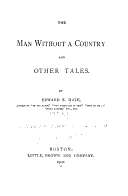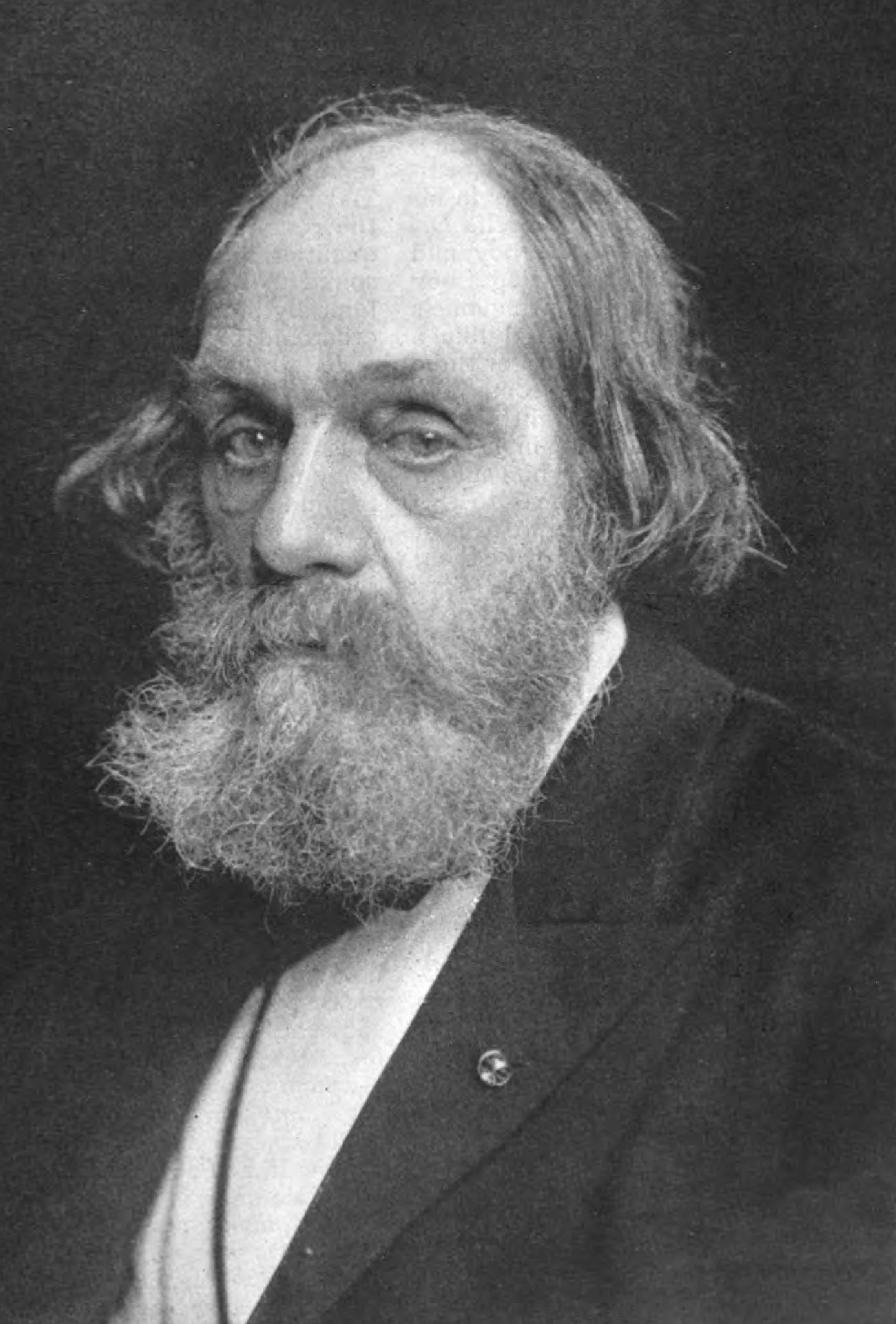Works

The Man Without a Country
Edward Everett HaleThe Brick Moon
Edward Everett HaleFamous Edward Everett Hale Quotes
Attributed to Edward Everett Hale in: United States. President (1922). Addresses of the President of the U.S. and the Director of the Bureau of the Budget. p. 80
Statement published in A Year of Beautiful Thoughts (1902) by Jeanie Ashley Bates Greenough, p. 172, Third statement for June 11. This has often been misattributed to Helen Keller in some published works since at least 1980, perhaps because she somewhere quoted it.
Variant:
I am only one,
But still I am one.
I cannot do everything,
But still I can do something;
And because I cannot do everything,
I will not refuse to do the something that I can do.
The Book of Good Cheer : A Little Bundle of Cheery Thoughts (1909) by Edwin Osgood Grover, p. 28; also in Masterpieces of Religious Verse (1948) by James Dalton Morrison, p. 416, where it is titled "Lend a Hand"
Variant: I am only one, but still I am one. I cannot do everything, but still I can do something; and because I cannot do everything, I will not refuse to do something that I can do.
Reported in Josiah Hotchkiss Gilbert, Dictionary of Burning Words of Brilliant Writers (1895), p. 150.
Edward Everett Hale Quotes about life
In this advice was much wisdom. It consists, you see, in advising to begin, at the beginning, and to stop when you have done.
Thirdly, and always,
Use Your Own Language.
I mean the language you are accustomed to use in daily life.
How To Do It (1871)
Source: How To Do It (1871), Ch. IV : How To Write
Context: You may divide literature into two great classes of books. The smaller class of the two consists of the books written by people who had something to say. They had in life learned something, or seen something, or done something, which they really wanted and needed to tell to other people. They told it. And their writings make, perhaps, a twentieth part of the printed literature of the world. It is the part which contains all that is worth reading. The other nineteen-twentieths make up the other class.
Ten Times One is Ten (1870)
Edward Everett Hale Quotes
“It is the part which contains all that is worth reading.”
Source: How To Do It (1871), Ch. IV : How To Write
Context: You may divide literature into two great classes of books. The smaller class of the two consists of the books written by people who had something to say. They had in life learned something, or seen something, or done something, which they really wanted and needed to tell to other people. They told it. And their writings make, perhaps, a twentieth part of the printed literature of the world. It is the part which contains all that is worth reading. The other nineteen-twentieths make up the other class.
"The Man Without a Country" (1863) - Full text online http://www.gutenberg.org/files/15868/15868-h/15868-h.htm#toc_2
Context: No matter what happens to you, no matter who flatters you or who abuses you, never look at another flag, never let a night pass but you pray God to bless that flag. Remember, boy, that behind all these men you have to do with, behind officers, and government, and people even, there is the Country Herself, your Country, and that you belong to Her as you belong to your own mother. Stand by Her, boy, as you would stand by your mother, if those devils there had got hold of her to-day.
"The Brick Moon" (1869) - Full text online http://www.gutenberg.org/etext/1633
Context: Can it be possible that all human sympathies can thrive, and all human powers be exercised, and all human joys increase, if we live with all our might with the thirty or forty people next to us, telegraphing kindly to all other people, to be sure? Can it be possible that our passion for large cities, and large parties, and large theatres, and large churches, develops no faith nor hope nor love which would not find aliment and exercise in a little "world of our own"?
Ten Times One is Ten (1870)
Context: That day the whole world held festival. All schools were dismissed, — all banks and workshops and factories closed, — all "unnecessary labor suspended," as the great salutes and the great chimes came booming out, which announced the agreement of a world of self-forgetting men. That day, do I say? Every day from that day was festival, — century after century. So soon as the world once learned the infinite blessing of Active Love, and stayed it by Faith, and enjoyed it in Hope, there was no danger that the world should unlearn that lesson.
That lesson — if this vision of a possibility prove true — comes to the world by no change of law; by no new revelation, nor other gospel than the world has now. It comes simply as man after man and woman after woman lead such unselfish lives, as all of us see sometimes, as all would be glad to live...
“If you have accomplished all that you have planned for yourself, you have not planned enough.”
In Quote, Unquote (1977) by Lloyd Cory, p. 6, this statement was simply attributed to the Meggido Message which is the name of a publication by the Meggido Church http://www.megiddo.com/, but immediately following a quote by Hale. This may have led to it being attributed to Hale in The Quotable Manager : Inspiration for Business and Life (2006) by Joel J. Weiss, p. 128; a similar expression "If you have achieved all you have planned for yourself, you have not planned enough" occurs in two works by John Mason: Let Go of Whatever Makes You Stop (1994), p. 79, and Know Your Limits — Then Ignore Them (2000), p. 123
Misattributed
“Look up and not down, look forward and not back, look out and not in, and lend a hand!”
Variants of "the Four Mottos":
Look up and not down;
Look out and not in.
Look forward and not back;
Lend a hand!
As used in Our New Crusade (1884)
Look up and not down;
Look forward and not back;
Look out and not in; —
Lend a hand!
Handwritten version published in an 1917 edition
Ten Times One is Ten (1870)
“He loved his country as no other man has loved her; but no man deserved less at her hands.”
Epitaph of Philip Nolan in "The Man Without a Country" (1863)
Reported in Van Wyck Brooks, New England: Indian Summer, 1865–1915 (1940), p. 418, footnote. Another source states: "The celebrated anecdote... is not so unambiguous as it appears... There is no reason to doubt the authenticity of Hale's reply, but it should be understood within a framework of respect for the senators as well as concern for the country. He knew every one of them personally and regarded them, as he said in his preface to Prayers in The Senate (1904), as 'intelligent men, in very close daily intimacy with each other, in the discharge of a common duty of the greatest importance.'" John R. Adams, Edward Everett Hale (1977), pp. 100–101.
Disputed
“Do you pray for the Senators, Dr. Hale?”
someone asked the chaplain. "No, I look at the Senators and pray for the country."
Reported in Van Wyck Brooks, New England: Indian Summer, 1865–1915 (1940), p. 418, footnote. Another source states: "The celebrated anecdote... is not so unambiguous as it appears... There is no reason to doubt the authenticity of Hale's reply, but it should be understood within a framework of respect for the senators as well as concern for the country. He knew every one of them personally and regarded them, as he said in his preface to Prayers in The Senate (1904), as 'intelligent men, in very close daily intimacy with each other, in the discharge of a common duty of the greatest importance.'" John R. Adams, Edward Everett Hale (1977), pp. 100–101.
Disputed
Statement published in A Year of Beautiful Thoughts (1902) by Jeanie Ashley Bates Greenough, p. 172, Third statement for June 11. This has often been misattributed to Helen Keller in some published works since at least 1980, perhaps because she somewhere quoted it.
Variant:
I am only one,
But still I am one.
I cannot do everything,
But still I can do something;
And because I cannot do everything,
I will not refuse to do the something that I can do.
The Book of Good Cheer : A Little Bundle of Cheery Thoughts (1909) by Edwin Osgood Grover, p. 28; also in Masterpieces of Religious Verse (1948) by James Dalton Morrison, p. 416, where it is titled "Lend a Hand"
